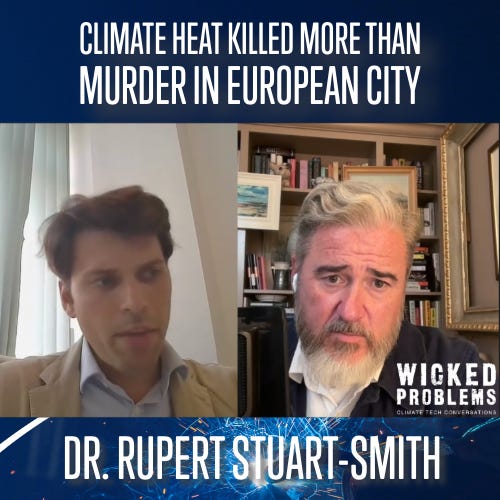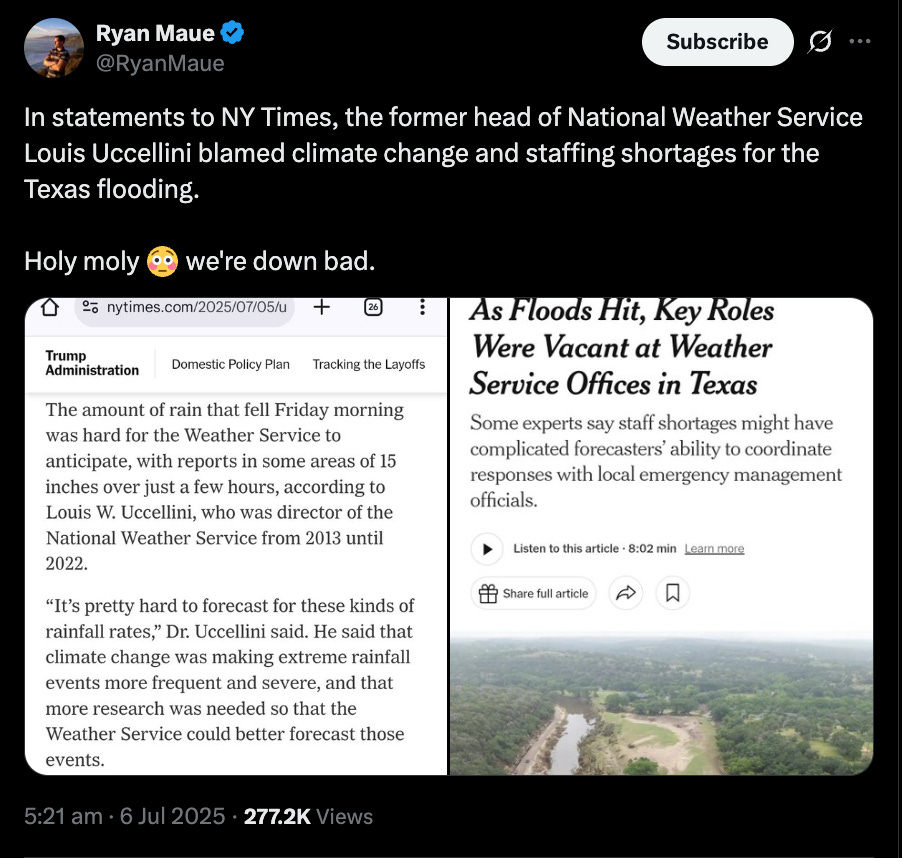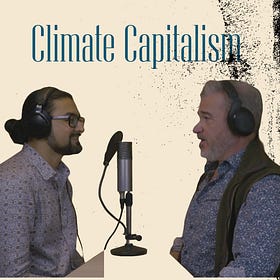Cruel Summer
It’s been a long summer and a delayed re-entry into what passes for reality these days. We’re well used to being slightly out-of-phase, and we’ve tried to make it a strength to let us look at things from that slightly different POV.
So we’re already waiting for The Fall, that feeling of being in the interstices between seasons. And Maxwell’s syncopated, out-of-joint take on it is our outro track for today’s episode:
Climate Deaths > Murder Deaths
Researchers led by Dr. Rupert Stuart-Smith - deputy director at the Sustainable Law Programme at the Oxford Smith School - released a new study this morning showing some 1,700 deaths in Zürich between 1969 and 2018 attributable to climate change. From heat deaths. In Zürich.
We got the chance to speak to Rupert yesterday, before publication. Our conversation hits on the study, how it came about, and what it means for the wider field of climate attribution science - and how that’s applied in law and policy.
It’s a first-of-its kind city-level attribution study, with implications that go far beyond Switzerland.
Notably, a pre-print of the paper was cited by the European Court of Human Rights in its reasoning for the landmark Klima Seniorinnen ruling - itself one of the precedents that led to the International Court of Justice advisory opinion about state obligations to protect against harms from fossil fuel-caused climate change.
One of the most striking elements of the study is that many of the deaths, compiled using all-cause mortality data and analysed using long-standing epidemiological methods not rooted in climate, took place outside of the headline-making heatwaves that now take an annual death toll.
It’s not in the study, but I thought it’d be interesting to try and work out a comparison. Zürich isn’t generally thought of as being a particularly hot city. (Though I did think to bring portable fans to a workshop in a Zürich office building this summer, which made me a lot more popular.) It’s also generally not thought of as high-crime. So, just out of curiosity, I wondered how the homicide rate compared.
Did more people in Zürich die from murder or from climate-change-aggravated heat deaths?
Switzerland’s homicide rate over 1969-2018 ranged from .6 to 1.5 per 100,000, usually staying around 1.0. The canton of Zürich makes up about 17% of population. Over that period, you could expect to find some 520 reported homicides in Zurich, using that logic.
Which means that, even if it’s back-of-the-envelope numbers, it seems reasonable to conclude that more people died because of climate change in Zürich over that period than from homicide.
“They Don’t Want You To See This”
Few people in climate solutions journalism are more respected than Akshat Rathi of Bloomberg. He is rigorous, sober, thoughtful, and more known for his warm and gentle wit (disarming his subject before the rapier-thrust followup question) than sounding the alarm.1
A sign of how times have changed is that Akshat of late has more frequently been hitting that klaxon. Posting about a magisterial piece by Team Bloomberg Green that documents the more than 400 anti-science actions taken by the Trump Administration in its first six months, Akshat pointed to one particular takeaway, that the US has just stopped adding to its official data about natural disasters causing $1Billion+ in damage.
That Bloomberg feature is about the most comprehensive list of official vandalism and sabotage around - from the laughable anti-science used as a pretext to try and overturn the Environmental Protection Agency’s 2009 “endangerment” finding that is the basis for most US climate regulation since then to the steady decimation of the capacity to measure and forecast weather, emissions, pollution, and other harms. In short, the US has put out its own eyes like some nation-sized Oedipus on meth.
That none of this comes as a great surprise to people paying attention does not make it less shocking to see it catalogued in one place. It’s one thing for people to threaten a murder-suicide pact of public health and climate science. It’s another to actually watch it happening.
Attribution science, the idea that it is possible to quantify - to a “balance of probabilities” standard used all the time in civil litigation - the influence of man-made climate change on specific extreme events like floods and heatwaves, isn’t exactly new. But the fossil fuel industry and its lackeys have been fighting tooth and nail to try and prevent its acceptance.
Near the end of the first Trump Administration, weather startup meteorologist Ryan Maue was named chief scientist at NOAA. Maue, the sort of heterodox thinker who nonetheless could be taken seriously because they retained at least patina of credibility, was exactly the sort of winking sceptic popular pre-2021 in those circles. He was also smart enough to be one of the first to see the threat attribution science posed to the project of climate scepticism.
As Science reported in September 2020 on the announcement of his new role at NOAA, Maue has long targeted attribution science. They quoted his Twitter feed:
“If you question the efficacy of attribution science, then you risk being smeared and censored.”
If Ryan Maue has a nemesis, Rupert Stuart-Smith comes closest to fill the role. He literally wrote the rulebook for guidance on best practices for climate attribution science, released earlier this year.
Adaptation
Another interesting findings in their study is that over that 50-year period, some 700 lives that would otherwise have been lost to climate-change-related heat deaths were avoided in Zürich because of adaptation measures. The slow adoption of air conditioning, general rising awareness of the need to consider heat safety for vulnerable populations and people in their home or work who now need to behave differently than they had for centuries.
That finding has - or should have - massive implications for policymakers around the world. It may finally get more attention this autumn at COP30 in Belèm, when the long-delayed “Global Goal on Adaptation” is meant to be foregrounded on the international agenda. Adaptation and resilience have been the red-headed stepchild of climate since even before the GGA’s inclusion in the Paris Agreement.
As Carbon Brief’s Simon Evans explained in conversation with Ed Crooks and Amy Myers-Jaffe on the most recent Energy Gang podcast, the reasons it has lagged are complex. Including the fact that adaptation strategies are extremely localised and hard to generalise to a global programme.
Those parts that are generalisable - like the recognition that “managed retreat” will be required in a mind-bending number of places affecting a mind-numbing number of humans, many of whom will become climate migrants, all of which has to be paid for - are politically impossible for most leaders to even acknowledge, never mind discuss openly.
And yet, as the Australia Institute points out in a new report out today, pretending that the problem doesn’t exist doesn’t prevent sane observers from, like Akshat, sounding the alarm at the growing mismatch between the geometric rate of increase in scale of the damage versus the linear rate of increase of resources available to adapt and recover:
More palatable will almost certainly be a suite of adaptation technologies that we’ve tried to keep an eye on.
But as Stuart-Smith et al point out, adaptation and resilience measures are necessary — but far from sufficient. No amount of adaptation will be sufficient to avoid the suffering that will occur is already measurable without dramatic reductions in fossil fuel emissions.
Follow Stuart on BlueSky, LinkedIn, and check out the Oxford Sustainable Law Programme.
Shot/Chaser
Days ago, as part of its immigrant scapegoat authoritarian consolidation moves, the Trump Administration swept into a Hyundai-LG battery plant in Georgia. This is exactly the kind of investment Trump says he demanded from foreign companies in the US. Arriving in armoured vehicles like they were descending on Fallujah, federal agents arrested 475 people, mostly South Korean nationals, shackling their legs to their wrists. And producing the now-traditional torture porn videos that seem to enliven and arouse Trump supporters.
Predictable outrage in Korea followed at the spectacle of fellow citizens shackled for the crime of helping build up the economy and make up for the shortage of skills of their supposed American allies. Trump, somehow, made it worse, telling a reporter:
“You know, look, it's a battery factory in that case as I'm told. And you know, when they're building batteries, uh, if you don't have people in this country right now that know about batteries, maybe we should help them along and let some people come in and train our people to do, you know, complex things, whether it's battery manufacturing or computer manufacturing or building ships. So, we're going to look at that whole situation. We have a lot of industries that we don't have anymore, and we're going to have to train people. And the way you train people is bring people in that know what they're doing and let them stay for a little while and help.
So I'm going to look at that.”
This, in the very same week American auto industry leaders GM, Ford and Stellantis - responding to Trump’s very clear direction to destroy the investments it had already made to try and catch up on those same battery technologies - announced they were further scrapping EV production (and battery tech) to focus on … internal combustion engine cars and trucks.
It is so much worse than you think.
Make Them Pay
We’ve gone on enough for today. And we’ve got plenty in the pipeline for you that we think you’ll love. But tell us what you want more of in these spaces.
If your response to all of this is a barbaric yawp or existential scream, that’s understandable. But shoutout to the plucky popular front of protest coming on London’s streets in 10 days - a coalition of unions, Palestine solidarity, climate justice, economic inequality, faith groups, migrant rights, and more. It might be a useful outlet for what you’re feeling if you’re in town.
Find out more at Make Them Pay.
Outros
As ever, we bring you the select outros from our episodes - we don’t know who listens, but we find it keeps us calmer to catalogue them.
PS
Where’s Ryan Maue now? Despite not getting an official role dismantling climate science as part of Trump 2.0, even the fatal Texas floods of the summer weren’t enough to get him out of his anti-anti pose:
In my chat with him last year I couldn’t even get him to take the bait to criticise Elon Musk!
Akshat Rathi: Climate Capitalism
In this milestone 50th episode, Richard Delevan interviews Akshat Rathi about his book "Climate Capitalism," discussing the intersections of technology, policy, and systemic change needed to combat climate change. Akshat shares personal stories, insights from his research, and his views on the future of capitalism in addressing environmental issues. This episode combines deep analysis with light-hearted moments, offering listeners both education and entertainment.















